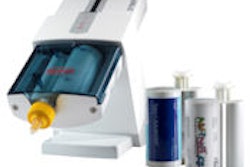A synthetic biphasic calcium phosphate material proved as reliable after a year as deproteinized cow bone for sinus augmentation in a clinical implant trial reported online May 11 in Clinical Implant Dentistry and Related Research.
Researchers from Gayle County Hospital, Göteborg University, and other Swedish institutions said they used the two materials on each side of the mouths of nine edentulous patients and two partially edentulous patients with a bilateral need for sinus augmentation and who had less than 5 mm residual bone in the floor of the sinus and a crestal width of 4 mm or more.
After eight months of graft healing, they placed 62 implants with an SLActive surface. After a mean of 118 days, they placed fixed prostheses. The success rate for the implants in the synthetic material was 91.7%, while the success rate for those in the cow bone was 95.7%.
Comparing marginal bone loss around the implants, the researchers found no significant difference that depended on whether the implants were in the synthetic material, the cow bone, or the patient's own residual bone. The mean graft resorption was 0.43 mm for the synthetic augmentation and 0.29 mm for the cow bone.
Copyright © 2010 DrBicuspid.com



















